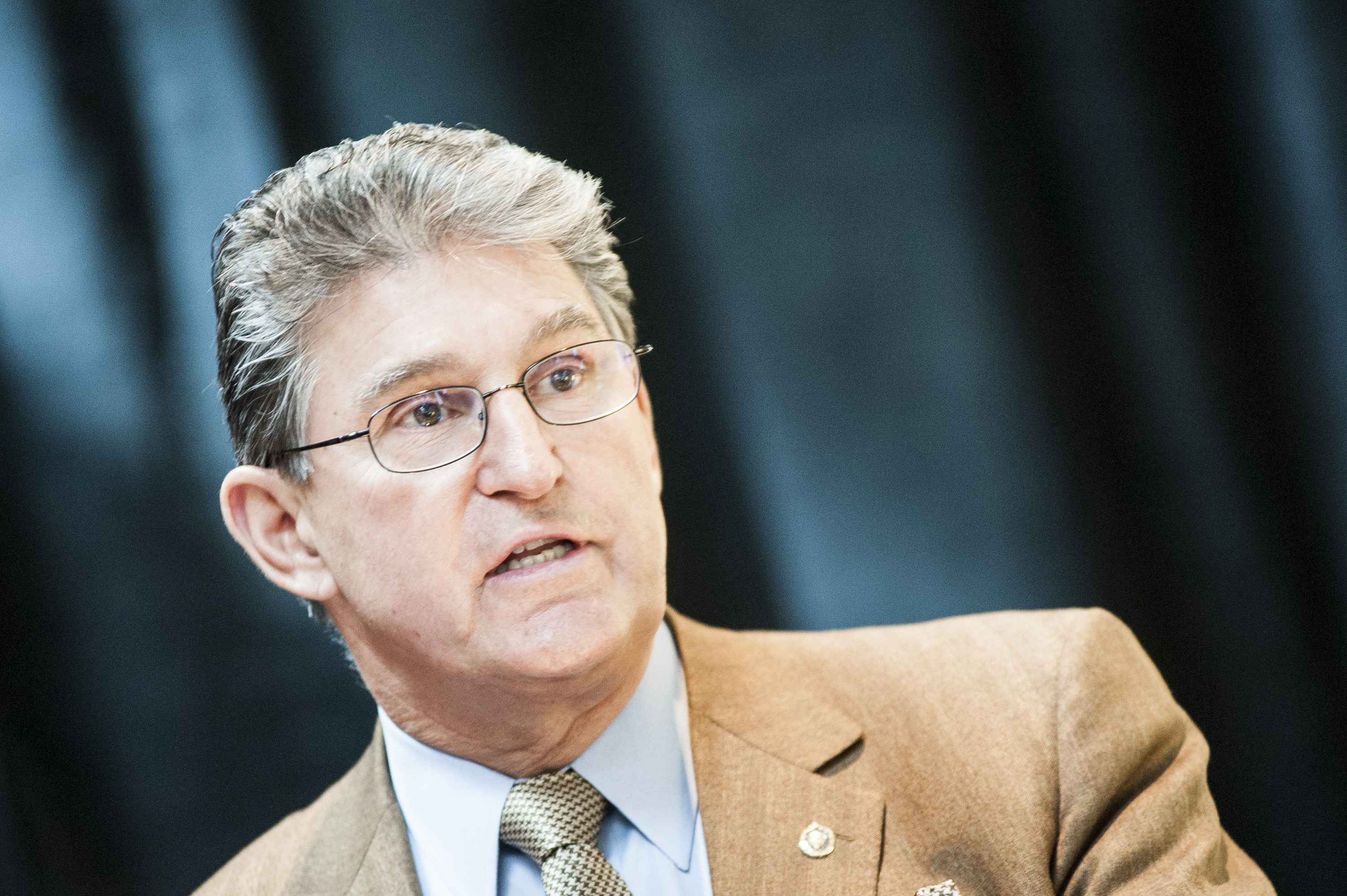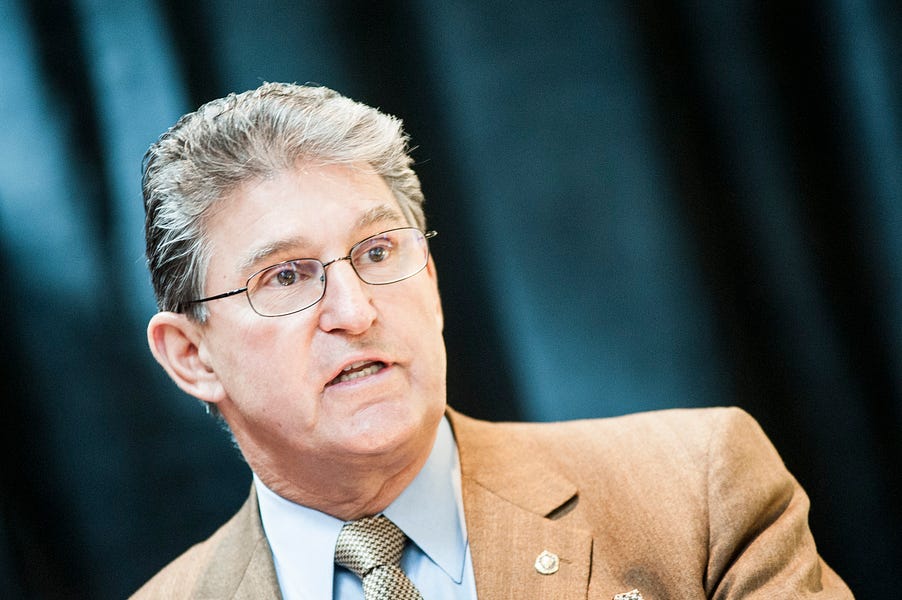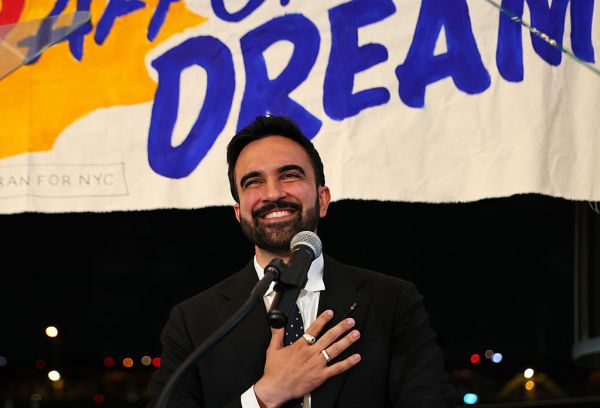Happy Monday! ‘Spider-Man: No Way Home’ made $253 million in the United States this weekend—$30.28 of which came from one of your Morning Dispatchers and his dad—and it deserved every penny.
Quick Hits: Today’s Top Stories
-
Democratic Sen. Joe Manchin announced Sunday that he “cannot” support Democrats’ Build Back Better Act, effectively dooming its chances of becoming law. Although Manchin has been publicly ambivalent about the bill for months, the White House released a lengthy statement yesterday afternoon laying into Manchin for “reversing” his position.
-
Pfizer announced Friday that two doses of its three-microgram COVID-19 vaccine for small children was found in clinical trials to generate a sufficient immune response in those ages six- to 24-months-old, but not in children ages two to four. The company said no safety concerns were identified for either age group, and it will amend the study to include a third three-microgram dose to be administered at least two months after the second dose.
-
A federal appeals court on Friday ruled 2-1 to dissolve a lower court’s stay and allow the Biden administration to reimplement its vaccine-or-testing mandate for large companies. Citing the uncertainty surrounding the rule, the Labor Department announced over the weekend it would not issue citations for noncompliance with the rule’s testing requirements until February 9. Business groups affected by the mandate have already asked the Supreme Court to weigh in.
-
The overall death toll from the series of tornadoes that ravaged the South and Midwest earlier this month rose to 90 over the weekend. Kentucky Gov. Andy Beshear told reporters Saturday the number of missing persons tied to the tornadoes in the state was down to zero.
-
Chinese tennis star Peng Shuai told a Singaporean media outlet over the weekend that she had “never said or written that anyone has sexually assaulted [her],” in direct contradiction with her November social media post accusing former Chinese Communist Party Vice Premier Zhang Gaoli of sexual assault. The Women’s Tennis Association reiterated that it remained concerned about her well-being.
-
Johnny Isakson, former Republican U.S. senator from Georgia who resigned due to health complications in 2019, died Sunday at the age of 76.
Joe Manchin Rips the Band-Aid Off

After devoting 1,900 words to the state of Build Back Better (BBB) negotiations in Friday’s TMD, we didn’t anticipate returning to the subject for at least another week or two. Democrats had not yet secured the 50 votes necessary to advance the multi-trillion dollar package, members of Congress were heading home for the holidays, and even President Joe Biden conceded Thursday night that nothing much was going to happen until the new year.
But on Sunday morning, Sen. Joe Manchin—the most prominent Democratic holdout on the legislation—decided against stringing his party, and the country, along any further. “I cannot vote to continue with this piece of legislation,” Manchin told Fox News’ Bret Baier, reiterating longtime concerns about inflation, the national debt, and the “shell games” used to artificially reduce the bill’s topline cost. “I just can’t. I’ve tried everything humanly possible. I can’t get there.”
“This is a no on this legislation,” he confirmed.
The news reverberated throughout Washington immediately. Democratic leaders had already dropped a series of provisions from BBB’s original framework in an effort to secure Manchin’s crucial vote in the evenly divided Senate.
The West Virginian had long been non-committal on the package, but Democrats felt spurned by Sunday’s pronouncement all the same.
“Senator Manchin promised [in meetings with President Biden last week] to continue conversations in the days ahead, and to work with us to reach that common ground,” White House press secretary Jen Psaki said in an uncharacteristically withering statement. “If his comments on FOX and written statement indicate an end to that effort, they represent a sudden and inexplicable reversal in his position, and a breach of his commitments to the President and the Senator’s colleagues in the House and Senate.”
As recently as Thursday, Biden had sought to portray BBB negotiations as being close to the finish line. “I believe that [Sen. Manchin and I] will bridge our differences and advance the Build Back Better plan, even in the face of fierce Republican opposition,” he said.
But those hopes were dashed early Sunday morning, when Manchin sent an aide to inform the White House and Democratic leadership of his opposition to the bill roughly 30 minutes before his Fox News appearance. Per Politico, the senator subsequently “refused” to take a phone call from a member of Biden’s staff.
Manchin’s decision may have been a surprise to the White House, but progressive Democrats claimed Sunday that they’d long seen the writing on the wall. “There are six of us who had been saying this all along,” Rep. Cori Bush told MSNBC, referring to the lawmakers who voted against the bipartisan infrastructure framework (BIF) last month in an attempt to maintain leverage over Manchin and his fellow centrist Democrat, Sen. Kyrsten Sinema, on the larger package. “This was a ‘no’ all along. … Having [the BIF and BBB] coupled together was the only leverage we had. And what did the Caucus do? We tossed it!”
“[Manchin] routinely touts that he is a man of his word, but he can no longer say that,” Rep. Pramila Jayapal, chair of the Congressional Progressive Caucus, added. Sen. Bernie Sanders accused his colleague of “not having the guts” to stand up to special interests and called on party leaders to bring the legislation to the floor to “let him vote ‘no’ in front of the whole world.”
There are undoubtedly some Democratic lawmakers who harbored concerns about BBB and privately thanked Manchin yesterday for taking all the heat, but it wasn’t just the party’s most progressive members who were frustrated with the West Virginian on Sunday. Sen. Debbie Stabenow of Michigan said the American people were “counting on us to get this done,” and Sen. Jacky Rosen of Nevada claimed her constituents “can’t afford to wait for relief.” Even Rep. Abigail Spanberger—who last year told her colleagues to “[never] use the word ‘socialist’ or ‘socialism’ ever again”—argued yesterday it was “unacceptable” for Manchin to “summarily walk away from productive negotiations.”
But at the same time, if you told Democrats last January they’d be wrapping up Biden’s first year in office—with an evenly divided Senate—having passed a $1.9 trillion coronavirus relief package and $1 trillion infrastructure package, many would consider that a win. “The amount of frustration that is building here, so much of it was avoidable,” Liam Donovan, a lobbyist and former Republican Senate campaign operative, told The Dispatch last week, arguing Democrats have been “setting the expectations way too high and poorly managing them.”
The same impulse kicked into gear once again on Sunday, as Democratic officials and pundits began convincing themselves that Manchin’s “no” could actually mean “maybe.”
“The best-case scenario for Biden is that Manchin intended his comments today not as a definitive end to negotiations but as a hard-line tactic aimed at forcing Democrats to take his position seriously, to stop trying to pressure him to buckle, and to end their attempts to win his support merely by tinkering around the edges of Build Back Better,” Russell Berman wrote in The Atlantic.
“Ok, so BBB can’t get 50 votes,” Democratic Sen. Chris Murphy tweeted. “There’s still a lot of life changing stuff in BBB that CAN get 50 votes. Not a great day. But take a deep breath, everyone.”
The White House’s blistering statement may have done more to drive Manchin away than cause him to reconsider, but Psaki, too, left open the possibility of him changing his mind. “Just as Senator Manchin reversed his position on Build Back Better this morning,” she said, “we will continue to press him to see if he will reverse his position yet again, to honor his prior commitments and be true to his word.”
The Omicron Wave Is Here
New coronavirus cases surging while scientists scramble to understand what we’re up against. The NBA postponing games as player after player tests positive. Elite New England universities sending students home and asking them to stay there. Talk of “flattening the curve.” New York City pleading with the federal government to invoke the Defense Production Act. Omicron is here, and—if you squint—it looks a little bit like March 2020.
We’re far, far better off than we were 21 months ago, of course, but the latest COVID-19 variant has brought with it a sense of uncertainty and fear not experienced since the pandemic’s earliest days. “We Know Enough About Omicron to Know That We’re in Trouble,” reads one recent headline. “Omicron Is About to Overwhelm Us,” blares another.
When we first reported on the new variant three weeks ago, public health experts urged patience, noting it would take time for scientists to provide answers to what Dr. Monica Gandhi—an infectious disease specialist at the University of California, San Francisco—described as the three most important questions about Omicron: “Is it more transmissible? Is it more virulent? And will it evade the vaccines?”
The answer to the first question is almost assuredly yes. A study out of Japan earlier this month pegged Omicron as 4.2 times more transmissible than Delta, which itself was between 1.5 and two times as transmissible as the virus’ original Wuhan strain. The United Kingdom Health Security Agency’s chief medical adviser estimated Omicron’s R0—a measure of how many other people a person with the virus will infect, on average—to be between three and five.
Alternatively, you could just look at the real-world data. The rolling average of daily new cases in South Africa increased from 1,043 on November 25—when health officials announced the discovery of Omicron—to more than 23,000 last week. Average daily cases in the United Kingdom—where Omicron is now the dominant strain—have jumped from 43,000 to nearly 78,000 over the same time period, and now sit approximately 30 percent higher than the country’s peak last winter. New York—one of the states hardest hit by the Omicron wave thus far, though Delta remains the dominant strain in the United States for now—set a daily record for confirmed COVID-19 cases two days in a row over the weekend. Increased testing certainly contributed to that, but New York’s testing positivity rate is at an all-time high as well.
When it comes to the third Omicron question—vaccine evasion—a relatively consistent picture is starting to take shape across a variety of studies: Two doses of an mRNA vaccine are still likely to protect against severe disease, but it’ll take a third dose to secure the level of protection against infection that two doses previously afforded. From a TMD earlier this month:
Vaccines provide two different types of immunity: Humoral (antibody-driven) immunity that neutralizes pathogens more quickly but generally wanes over the course of a few months, and cell-mediated (T-cell-driven) immunity that doesn’t necessarily prevent infection but sticks around in the body much longer.
“Even if the number of mutations on the [Omicron] spike protein affect neutralizing antibodies, it is likely the T-helper-cell epitopes and cytotoxic T-cell epitopes will still remain intact,” said Dr. Paul Offit, director of the Vaccine Education Center at the Children’s Hospital of Philadelphia. “That’s what you would imagine would be true because that always has been true. That immunological memory—with T-cells and B-cells—ultimately is going to protect against serious illness. And I think it’s extremely likely that two doses will protect against serious illness, just as was true for the other three variants.”
It’s on question number two (virulence) where there’s the most at stake—and the most remaining uncertainty. What began as anecdotal evidence of milder symptoms associated with Omicron in certain individual cases has, over the past week or so, strengthened into real-world epidemiological data in some countries pointing toward a decoupling of infections and hospitalizations/deaths—but caveats apply.
South African Health Minister Joe Phaahla told reporters Friday that just 1.7 percent of patients with confirmed COVID-19 cases were hospitalized in the second week of this current wave—compared to about 19 percent during the Delta surge—but cautioned that the stark drop off could at least partially be attributed to South Africa’s younger population and the country’s particularly high level of natural immunity. Early data out of highly vaccinated Denmark found about 0.6 percent of confirmed Omicron cases between November 22 and December 15 ended up in the hospital, compared to about 1.5 percent of those who contracted another COVID-19 variant during the same window.
“I’m very much aware and obviously happy to see reports of lower hospitalization rates and lower severity associated with this,” Dr. Isaac Bogoch, a clinical epidemiologist and infectious disease expert at the University of Toronto, told The Dispatch on Sunday. But he said he’s waiting to see more robust data from countries like the United Kingdom before jumping to conclusions about what will happen in the United States or Canada.
“I get that there’s people with agendas who are pushing that this is the end of the world, and I get that there are people with agendas who are pushing that this is a nothingburger,” he added. “[But] people that know what they’re talking about, who don’t have an agenda, are still saying there’s uncertainty.”
Making the rounds on the Sunday shows yesterday, Dr. Anthony Fauci—Biden’s chief medical adviser—repeatedly emphasized his main concern with respect to Omicron had to do with hospital capacity. “It is quite likely that we are going to see, in some sections of the country, a significant stress on the hospital system as well as on the health care workers who are getting exhausted by all of this,” he told ABC News. Healthcare facilities in Minnesota, Ohio, Michigan, and elsewhere are already facing the crunch.
Whether this surge will be worse than previous ones in that regard will come down to a relatively straightforward algebraic expression whose coefficients, for now, remain uncertain. If Omicron is 30 percent less severe than Delta, for example, but between three and five times as transmissible, the decrease in virulence is going to be outweighed on a macro level by the sheer number of additional cases. “If a small percentage of people who are infected need to be in hospitals or need ICU care,” Bogoch said, “a small percentage of a massive number of people ends up being a lot of people still.”
But whatever Omicron ends up doing, it looks like it’s going to do it quickly: Daily new cases in South Africa appear to have already peaked, and Denmark may soon follow suit.
Worth Your Time
-
Former President Donald Trump has ramped up his attacks on Senate Minority Leader McConnell in recent weeks, but as Natalie Allison and Burgess Everett report for Politico, elected Republicans aren’t showing much appetite for throwing the Kentucky senator overboard. “Despite months of attacks, the Trump-led campaign to depose the Senate minority leader has resulted in firm pledges from just two Republican candidates and no senators, and it has failed to turn up a formidable challenger to run against McConnell,” they write. “Inside the Capitol, conservative senators shrug at the question, revealing a lack of appetite even among the GOP’s anti-establishment wing and continued strong support for McConnell as leader.”
Presented Without Comment
Toeing the Company Line
-
In Friday’s Vital Interests (🔒), Tom Joscelyn covered the bilateral meeting between Xi Jinping and Vladimir Putin intended to push back on the United States’ Summit for Democracy.
-
Friday’s Uphill (🔒) features a deep dive into the world of congressional stock trading and how “a bipartisan group of lawmakers is seeking to prohibit members of Congress from buying and selling individual stocks while in office.”
-
Jonah’s latest G-File is about privilege—and who gets to wield it. “In a big, boisterous, free society, all of the privileges don’t run one way,” he writes.
-
In his Sunday French Press, David looks at America’s loneliness epidemic—and what won’t fix it. “As religious and civic engagement declines, too many Americans are replacing religion with politics, and the false god of politics does not present the answer for what ails our hurting nation,” he writes.
Let Us Know
Do you think Build Back Better is really dead? Or is it “dead” like a horror movie villain?
Reporting by Declan Garvey (@declanpgarvey), Andrew Egger (@EggerDC), Charlotte Lawson (@lawsonreports), Audrey Fahlberg (@AudreyFahlberg), Ryan Brown (@RyanP_Brown), Harvest Prude (@HarvestPrude), and Steve Hayes (@stephenfhayes).







Please note that we at The Dispatch hold ourselves, our work, and our commenters to a higher standard than other places on the internet. We welcome comments that foster genuine debate or discussion—including comments critical of us or our work—but responses that include ad hominem attacks on fellow Dispatch members or are intended to stoke fear and anger may be moderated.
With your membership, you only have the ability to comment on The Morning Dispatch articles. Consider upgrading to join the conversation everywhere.